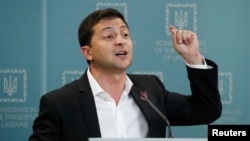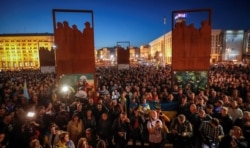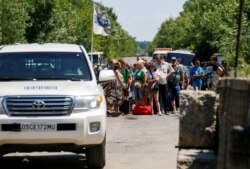Ukrainian President Volodymyr Zelenskiy will face an uphill battle selling a peace deal he approved midweek with Russia and pro-Moscow separatists in Donbas, which would see two breakaway republics become self-governing, although still part of Ukraine, say analysts.
The landmark deal aimed at ending a five-year conflict that has left more than 13,000 people dead has been welcomed by the Kremlin. Russian President Vladimir Putin’s spokesman Dmitry Peskov says he now expects a date to be set for four-way peace talks among France, Germany, Ukraine and Russia. He described the agreement as a “positive and without doubt, important step.”
But there’s rising skepticism in Ukraine about the deal known as the Steinmeier Formula, especially with its provision to grant special autonomous status for the Donbas region following elections. Under the agreement, the elections must be free of Kremlin influence.
Critics of the plan say Zelenskiy has given too much ground to Moscow.
Author and Oxford academic Timothy Garton Ash, noted authority on central Europe, says the deal amounts to a “major concession from Kyiv to Moscow, as it largely gives Moscow what it wants, which is autonomy for the Kremlin’s so-called Donetsk People’s Republic and Luhansk People’s Republic — the Russian-controlled areas of eastern Donbas in Ukraine — and a veto in effect on Ukraine’s geopolitical orientation.”
Ash says the few hundred nationalist demonstrators who protested the deal midweek, dubbing it a sellout, “have all the potential to be very violent and can build to something much bigger.”
Zelenskiy is banking on his overall high popularity to help him sell the deal. But a poll by Kyiv’s Rating Group found about 66% of respondents unsure about it, with 23% opposed and just 18% supportive. The formula for the agreement was proposed by Frank-Walter Steinmeier, the former German foreign minister.
Analysts say despite his overall 70% popularity rating, the bid for peace is a gamble for Zelenskiy, a former TV comedian and neophyte politician.
The Steinmeier Formula
Under its provisions, Russian forces and Moscow-backed militants have to leave the People’s Republics of the Donbas, and Ukraine would regain control over the adjacent border with Russia.
Elections would be monitored and supervised by the Organization for Security and Cooperation in Europe (OSCE). Only when the OSCE approves the conduct of the elections and deems them fair can the breakaway regions become self-governing.
“There will be no elections ‘at gunpoint’,” Zelenskiy told at a press conference in Kyiv Tuesday “If someone (militants) will be there, there will be no elections,” he said. Ukrainian government and separatist leaders say they will withdraw their forces from two locations in the Donbas region early next week as part of confidence-building.
Zelenskiy’s presidential predecessor, Petro Poroshenko, has come out against the agreement, describing it as a “capitulation” which will allow Russia to maintain a permanent presence in Ukraine. Andriy Parubiy, a former parliamentary speaker, said the plan was “an attempt to dismantle the Ukrainian state.”
Russian Foreign Ministry spokeswoman Maria Zakharova criticized Poroshenko Thursday, saying she couldn’t understand how he could condemn the agreement when it is based on the Minsk peace accords of 2015.
“In a democratic country, everyone has the right to have their own opinion. He or she has the right to express their positions, respecting the law, of course,” she said. “This (agreement) is a very important step to implement the Minsk accords. … I was really surprised that the implementation of the Minsk accords is not supported by (former) President Poroshenko, because they were signed by himself.”
Adrian Karatnycky, an analyst at the Atlantic Council, a U.S. research group, warned that all the key conditions of the deal would have to be observed by Moscow and the militants the Kremlin backs, including the surrender of their heavy weapons and complete Ukrainian control of the border.
“Anything less than that creates a permanent Russian enclave in Ukraine and de facto normalizes Russian aggression and occupation,” Karatnycky said.
One potential looming dispute will be over the civil police in the Donbas, according to James Sherr, an analyst at the Estonian Foreign Policy Institute and at Britain’s nonprofit Chatham House.
Writing on Facebook, Sherr said, “Ukraine has every reason to insist upon a strict interpretation of what this term (civil police) means, how it is armed, when this 'force' comes into being and who it answers to.”
Pro-Moscow separatists are also likely to make the path toward peace in eastern Ukraine rocky. Leaders of the separatist-held regions say the elections have to take place on their terms, and they have vowed not to relinquish control of the border with Russia.
The Steinmeier Formula is the first clear positive step since peace negotiations that stalled in October 2016. The deal comes just weeks after the 41-year-old Zelenskiy came to power promising a quick resolution to the conflict in eastern Ukraine, which has left a million people displaced since fighting flared in 2014.
In his election campaign, Zelenskiy blamed Poroshenko for the grinding conflict, presenting himself as the leader of a “party of peace” fighting against the incumbent “party of war.”
A poll in June found that 50% of Ukrainians expected Zelenskiy to end the shooting.
In July, in a video statement released to coincide with a one-day EU-Ukraine summit in Kyiv, Zelenskiy, who won a landslide election victory in April, appealed to Putin directly.
“We need to talk? We do. Let's do it,” he said, looking directly into the camera.
The election agreement is also testimony, say analysts, to the Kremlin’s eagerness to see Western sanctions lifted. They were imposed initially on Russia after it annexed the Ukrainian peninsula of Crimea in 2014.







